RE at CKIS
Our vision for Religious Education at CKIS
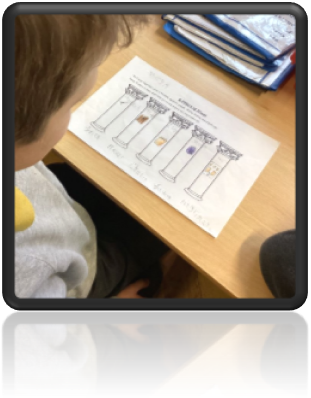
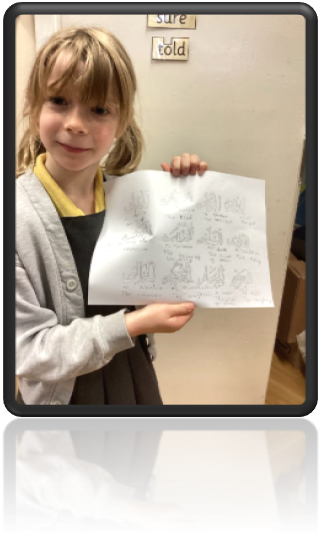
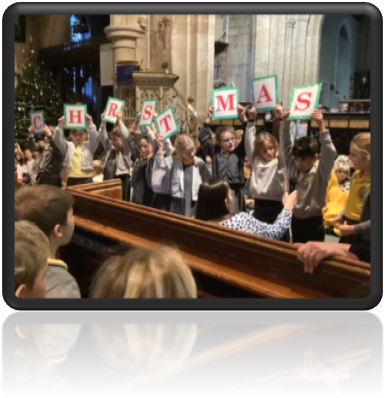
At Charlton Kings Infant School we aim to provide an inclusive environment where every child has the chance to develop as a kind and considerate member of our community.
We believe that encouraging and inspiring children to expand their knowledge of world views will develop a curiosity about not only their own experiences but the people and communities that surround them. We want to enable all children to investigate, respond, challenge and reflect on some of the most necessary questions asked by both children and adults. We want to expose them to different beliefs in order to build up their own understanding to express their insights in response, and to agree or disagree respectfully.
Allowing them access to this knowledge through a range of learning opportunities gives them skills that they can utilise for the rest of their lives. The curriculum is designed to develop knowledge and skills that are progressive, as well as transferable, throughout their time at CKIS and beyond.
Purpose and aims of Religious Education (Intent statement)
Our curriculum provides a broad range of experiences for our pupils: Our pupils’ backgrounds, our culture and our climate for learning provide the following drivers that underpin ALL areas of our Religious Education curriculum:
- Learning to learn - which helps pupils to concentrate and focus and build resilience as learners
The children are taught a range of religions and worldviews. They learn about religious figures who constructed different religions and varying beliefs and opinions. Our RE curriculum focuses on the knowledge and skills that children are able to apply to everyday life such as taking responsibility for themselves and others, working co-operatively, sharing ideas and discussing beliefs with others.
- Culture and Diversity - which helps pupils to develop enquiring minds about the wider world
Our RE curriculum promotes mutual respect and tolerance through creating inquisitive, confident, empathetic and respectful learners. It encourages children to deepen their knowledge of world views.
- Environment and Community - which helps to instil in our pupils a respect for our environment and for our local and wider communities
All children are given the opportunity to discover similarities and differences between each other and how, as a community, we can accept each other’s beliefs. As a school, we also encourage visits from members of the community such as Open the Book and class/ school visits to local places of worship.
– Creative arts and physical development - which helps our pupils to express themselves and excel as holistic learners
Through role play, art and open discussions, all children are given opportunities express their beliefs regularly. They are able to explore in a mutually respectful environment and how to understand each person as an individual.
We offer a thoughtful range of experiences that support our culture: pupils enjoy a ‘full spectrum’ of academic, physical, spiritual, moral, social, cultural activities that enrich their lives. We aim to ensure that all children have the confidence and skills to develop as resilient life-long learners.
Our curriculum has been developed over time through:
• Involvement in the local RE Hub
• Attending the local RE Conference
• Networking with other schools and settings as well as participating in the Gloucestershire subject leader network meeting for RE.
We aim for all pupils to know about and understand a range of religions and worldviews, so they are able to:
- Describe and explain different beliefs and practices that exist within our diverse communities.
- Experience opportunities for children to become aware of themselves and others and to reflect on their experiences and feelings.
- Gain the relevant skills to express and explain their ideas reasonably about the nature, significance and impact of religions.
- Appreciate and appraise the varied beliefs within religion.
- Use their imagination to observe, question, wonder and develop an appreciation of the world in which they live.
The teaching of Religious Education at CKIS (Implementation)
AT CKIS every child is recognised as a unique individual. We celebrate and welcome differences within our diverse school community, encouraging all to grow and flourish. Learning in RE is deeply rooted to this to allow all to express their beliefs in a safe and tolerant environment.
The ability to learn is underpinned by the teaching of basic skills, knowledge, concepts and values, with a vision to prepare our children to be life-long learners, rooted in our school motto: The wings to fly, the confidence to try.
The teaching of RE at CKIS builds towards clearly defined end points, which are laid out in our school topic learning leaves (example pictured below). This enables pupils, teachers and parents to know what we expect our pupils to achieve by the end of each topic, each year and each key stage.
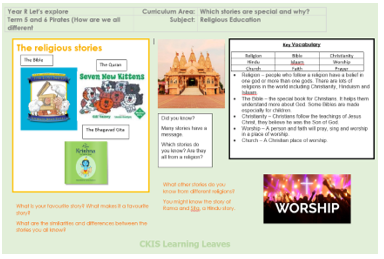
The Gloucestershire Agreed Syllabus
The Religious Education curriculum at Charlton Kings Infant School is designed using the Gloucestershire Agreed Syllabus. The Gloucestershire Agreed Syllabus a part of the basic curriculum that is taught alongside the National Curriculum in all schools. It offers carefully sequenced lessons in order for learning to be cohesively taught and has an overarching question for each topic to be used across one half term. Within this, there are several suggested questions that could be explored further in order to expand their learning. The units of study offer content and ideas for enabling pupils to achieve these aims. The learning outcomes within each unit of study are clearly split between the three elements of the teaching and learning approach: making sense of belief, understanding the impact and making connections. These three core elements, which are woven together to provide breadth and balance within teaching and learning about religions and beliefs, underpinning the aims of RE. These elements offer a route through each unit while also allowing for a range of questions reflecting different approaches, for example, from religious studies, philosophy, sociology, ethics and theology.
The RE teaching and learning approach in Gloucestershire
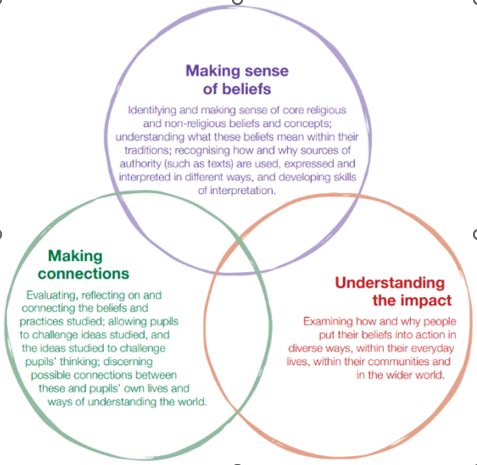
Religious Education in our Foundation Stage
RE as a topic is covered under the umbrella term of ‘Understanding the World’ within the EYFS Curriculum with there are several pointers surrounding knowing some differences between themselves and their communities in relation to religion and culture. It is introduced as a topic both directly and indirectly through activities that allow all children to explore, observe, compare and express their thoughts about the world around them. Using the Gloucestershire Agreed Syllabus, there are clear lesson ideas which allows quality teaching and learning to take place. It sets out what should be studied in RE and offers clear advice and guidance on how this can be done in order for all pupils to develop a coherent understanding of religions and non-religious beliefs. It promotes high standards and a consistent approach of RE within CKIS. Children in the Foundation Stage are actively encouraged to share their thoughts and experiences within RE lessons and during their continuous provision (Challenge Time). During challenge time they are exposed to a range of resources such as puppets, artefacts and related texts in order to aid in solidifying their learning of Religious Education. The main focus is for children within EYFS to begin the discovery process within Christianity and some other religions as well as thematic beliefs such as ‘what places are special and why?’.
Religious Education in KS1
In KS1at CKIS, RE is also taught following the Gloucestershire Agreed Syllabus. Once again, Religious Education is taught through well thought out whole-class lessons that are adapted to ensure every child in the class has access to the same quality teaching. Planning allows for the statutory 36 hours per year, the equivalent of one hour per week. RE can be delivered in weekly sessions but it can also be taught in longer or shorter blocks in order to fully immerse the children in their learning.
RE lessons at this level have an aim to develop and expand on previous RE learning. The children are progressing from ‘discovering’ the subject to ‘exploring’ the subject through developing their independence and being exposed to the wider concepts within religion. Throughout the teaching if RE in KS1, all children should develop their knowledge and understanding of religions and worldviews, recognising their local, national and global environments. They should be able to use some subject-specific vocabulary whist being able to raise questions and begin to express their own views in response to what they learn about.
As prior knowledge is built upon, all pupils within KS1 have the opportunity to consolidate key skills they have already learned such as effective questioning and the ability to show tolerance towards different beliefs.
KS2 and beyond
We ensure the children are ready for the KS2 curriculum by holding regular meetings with the subject leaders at Charlton Kings Junior School (CKJS) which enables both schools to demonstrate clear progression. We also carry out detailed handover meetings with the CKJS Year 3 team where assessment data is shared to show individual strengths and areas for development. CKJS follow the same Agreed Syllabus which allows for all children to be well equipped and continuity of the subject.
Religious Education outside of the classroom
All children in the school attend an ‘Open the Book’ assembly once a week. This is where a local church group read and act out stories from the Bible at a child friendly level.
Oracy in Religious Education
Oracy forms an important part of our Religious Education curriculum. Children are taught subject specific vocabulary, which is modelled and reinforced by adults in the class rooms as well as being displayed. During taught sessions and independent challenge time, children are encouraged to discuss and express their ideas surrounding the RE Curriculum. From Kindergarten to Y2 we use a range of literature and artefacts to create discussion and to embed any learning in a memorable way.
Medium term plans include key vocabulary and links for texts related to the SOW for each unit of study.

Demonstrating learning
In Religious Education, pupils are able to demonstrate their learning in many different ways.
In EYFS and KS1 children are able to demonstrate their understanding through real time responses in lesson time, completing work during continuous provision and during day to day classroom life. Teachers may choose to record samples of the children’s learning by placing an observation on See-Saw or by storing written evidence in their special folders or special books.
Teachers carefully plan and monitor progress and adapt medium term plans to include key questions and checkpoints for children to demonstrate understanding in age-appropriate ways.
- Seesaw- The children’s learning can be recorded and shared with parents through observations, videos and photos.
- Special books in KS1 and Special folders in EYFS- Children keep their ‘gold standard’ work to demonstrate their learning and understanding.
- Continuous provision- Children have the opportunity to solidify or further explore their learning through a child led and independent approach.
Meeting the needs of all pupils (inclusion)
Our school supports the principle that young children learn through play, and through well planned structured opportunities that are relevant, engaging and promote deep level thinking and learning.
Teaching through both a rich continuous provision, paired work, small group and whole class learning opportunities skilfully builds upon the experiences of the child and promotes their next steps as a learner. Some children may occasionally require additional resources, support, and scaffolding in order for them to achieve a secure understanding. The development of this understanding is enabled through the use of visual representations, external visitors and resources such as religious artefacts.
Teachers and Teaching Partners competently provide a balance of structured cross curricula learning activities and child-initiated opportunities through high quality indoor and outdoor learning environments.
In this way we aim to ensure that children are actively involved in their learning and deepen their knowledge, skills and understanding becoming masters of their learning as:
• Problem solvers
• Resilient learners
• Collaborative thinkers
• Inspired questioners
All pupils are entitled to a broad and balanced curriculum that meets their needs.
Religious Education is taught in class groups, and accessible in our provision with all pupils included. Some children may occasionally require additional resources, support, and scaffolding in order for them to achieve a secure understanding. The development of this understanding is enabled through the use of visual representations, external visitors and resources such as religious artefacts.
All our teachers know the pupils in their class and their differing needs well. They plan and adapt lessons to help all pupils know and remember more so they make very good progress.
Some pupils, including those with special educational needs or disabilities, or those with English an as additional language, may need extra support to access, understand and remember key concepts.
For these pupils, teachers use a range of effective strategies, whilst promoting independent learning as far as possible. These may include:
● adapting and scaffolding pupil activities and resources
● focussed additional support from an adult in class
● extra pre learning or overlearning of key knowledge before or after the lesson
Some pupils very quickly grasp the main concepts being taught and are able to think more deeply to extend their learning. To ensure they reach their full potential, teachers may:
● set more complex activities that require thinking at greater depth
● ask pupils to apply their knowledge to a different situation
● go further by asking them to explain their thinking to others or present their findings to a group
Assessment (Impact)
Formative Assessment
At CKIS teachers constantly assess how far their pupils understand key concepts throughout lessons, mainly through questioning and observation. Quizzes and other games are regularly used to assess how far pupils have remembered learning from the lessons before. Teachers then adapt their teaching to ensure misconceptions or gaps in knowledge are addressed. In addition, they may need to introduce opportunities for more challenge or deeper thinking.
End of unit Assessment
Key assessment criteria are written into our school curriculum and medium-term plans.
Assessments of children's learning are made and assessed through observations and classwork and shared as evidence on Seesaw. These assessments contribute to a summative judgement at the end of each term against the science statements supplied by the science lead and found on INSIGHT.
Teachers and subject leads monitor children’s progress and attainment throughout the year to inform ongoing teaching and learning. The Religious Education lead will undertake book looks, monitor INSIGHT, talk with children and monitor the balance of disciplinary/substantive knowledge that has been taught.
Reporting to families and statutory assessment
The children’s progress across the curriculum is shared with families twice a year during parents evening appointments and their learning is shared through observations, photos and videos on Seesaw throughout the year. At the end of every year, families also receive a report which highlights the children’s strengths and areas for development across the curriculum.
Monitoring and Evaluation
The subject leader for Religious Education monitors the quality of education regularly in accordance with the school’s monitoring timetable. This may take the form of:
● learning walks and drop ins, usually with a member of the senior leadership team, and sometimes with a governor.
● book looks. The subject leader looks at a range of books or other evidence across the school, sometimes with senior leaders or an adviser or governor.
● scrutiny of planning, particularly to evaluate coverage and progression within the curriculum as well as the extent to which planning is catering for the range of needs of pupils
● pupil conferencing
● surveys for pupils and/ or staff
● lesson observations
Subject leaders have regular support from the senior leadership team where aspects of the subject policy and action plan are monitored and discussed. Action plans are reviewed and shared with the staff three times a year to ensure all staff are aware of key actions.
Resulting actions may emerge with additional leadership support, resources or policy changes implemented.
Subject leaders routinely have a teacher appraisal objective linked to an aspect of their subject leadership. Following all these activities, strengths and areas for development are reported and discussed with staff. Resulting actions are recorded on the subject action plan and reported to governors.
At the end of each year the action plan for Religious Education is fully evaluated. In addition, the subject leader evaluates how far Religious Education is meeting our curriculum intent statement. This evaluation feeds into the action plan for the following year. Evaluated action plans and evaluations are reported to the senior leadership team and governors.
The role of the governors
Every subject has a specific governor allocated to it. The governor for Religious Education is Alan Waller.
This governor evaluates the activities within this aspect and the impact on the quality of education and pupil outcomes.
They meet with subject leaders and review aspects of the subject, including seeing lessons in practice and talking to children.
Their findings are reported to the Governing Board. In this way, leaders are held accountable for the aspects they are responsible for, and subject leaders are able to access the appropriate support and resources to achieve their aims.
